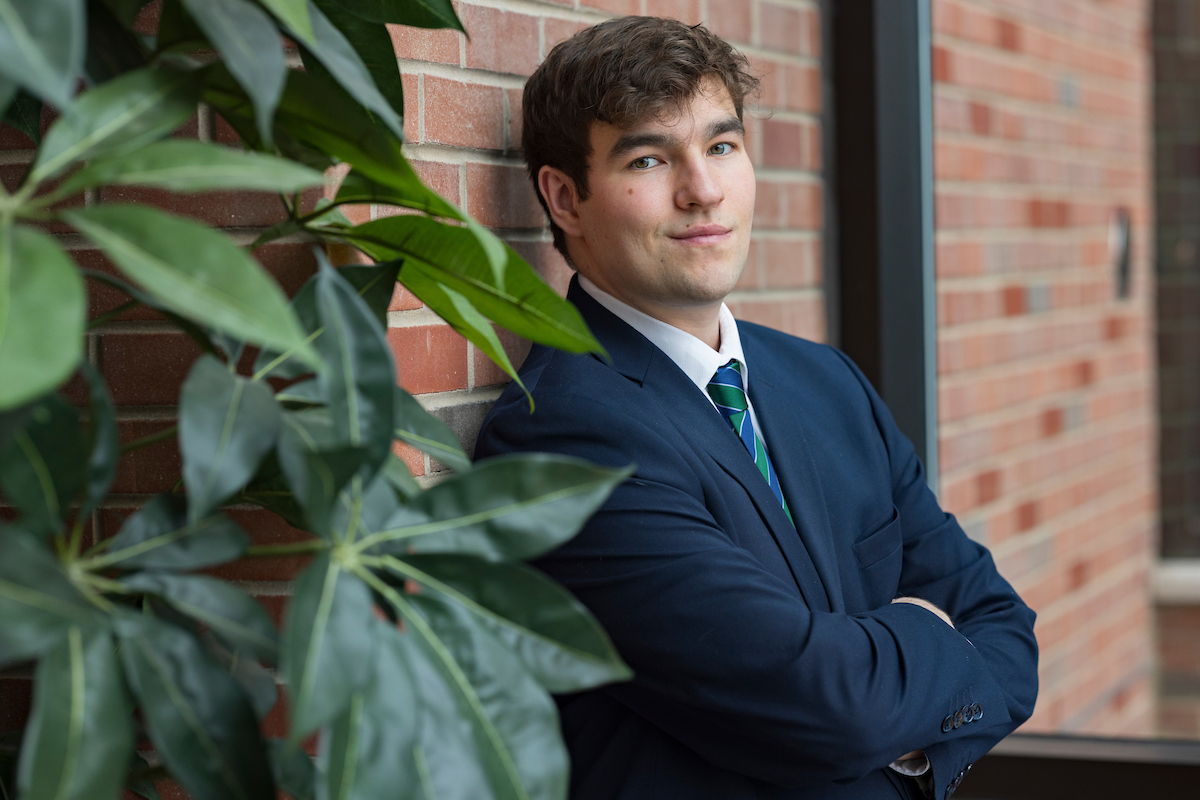Binghamton graduate student dedicated to growing a sustainable community
Student co-founded first college chapter of environmental justice organization Zero Hour

In his senior year of high school, Elijah Conlin tagged along with his friend to a climate conference featuring several prominent climate activists from across the United States. Conlin described a 45-minute lecture from one of the speakers as life-changing – it was here that the sobering reality of climate change became apparent to him for the first time.
As a first-year student, Conlin was interested in pursuing medicine, but his passion for the urgency and immediacy of climate concerns motivated him to co-found Zero Hour Binghamton, the first college chapter of an environmental justice organization focused on youth voices. Zero Hour focuses on advocacy for climate policy changes by and for the younger generation. The student-led organization is a worldwide effort towards the prospect of a healthier environment and more equitable society.
Conlin saw the potential of the group to expand onto college campuses, and after failing to find a student organization focused specifically on environmental justice at Binghamton, he and his friends began to fill that position. They tabled every week for “Fridays for our Future,” with Conlin sacrificing a significant portion of his time as a first-year student for the development of the campus group. Zero Hour Binghamton has grown substantially over the past four years, even inspiring Zero Hour organizers at other colleges, including Brown University.
“This requires a movement of people to get behind it, to change the paradigm of consume, consume, consume,” said Conlin. “This is a community. This is something that we want to preserve, sustain and move forward with.”
After receiving his bachelor’s in environmental studies in 2023, Conlin continued his studies at Binghamton, pursuing his graduate degree in sustainable communities. In addition to his studies and his continued work with Zero Hour Binghamton, Conlin works as a sustainable energy fellow for Network for a Sustainable Tomorrow (NeST.) NeST is a non-profit organization that connects and supports clean energy, education, climate justice and economic justice in the Southern Tier. With positions at Zero Hour and NeST, Conlin helps organize anything from trash cleanups to workforce development events. He embraces these roles as his contribution to a holistic, cooperative and action-oriented environmental justice regime for the greater Binghamton community.
Conlin emphasized that environmental justice cannot be achieved without integrating many other justice efforts; collaboration between different organizations led by individuals with shared passions allows for more resources and power to allocate toward representing the marginalized groups who are impacted most by climate change. Conlin recognizes that building trust with community organizations is essential for anything of value to happen.
He stressed the value of community integration and his hopes for the University and student organizers to use the community more effectively as a mutually beneficial learning environment.
“It takes one meeting… volunteer one day on Saturday for a community meal at the North of Main Area Community Center, or at Southern Tier Community Center,” said Conlin. “You have to see that there’s a real community around you.”
Conlin described the community not only as a place of acceptance and solidarity but as a valuable place to learn how to expand your perspective and make mistakes. Regardless of whether one decides to stay in Binghamton after earning their degree, four years is plenty of time to make a positive impact and develop the skill set to invest in any community, he said. However, Conlin made a point not to downplay careers in sustainability for students in the greater Binghamton area.
“I think that for people who are looking toward the future of workforce development … They should be very hopeful about the state of our economy here,” said Conlin.
In September 2023, Conlin helped organize the Greater Binghamton Clean Energy Career Summit, which brought together government, industry and community leaders to speak and provided networking and brainstorming opportunities for community members and potential employers. Conlin said the event was successful with turnout and responses, and they are continuing to find ways to collect feedback and make future workforce development efforts even better.
For Conlin, the immediacy of environmental justice and its impact on Binghamton residents was enough to acquire his full attention and efforts. With the support of peers, professors and the community, he believes that can help create tangible steps forward toward health and justice for the environment and the people living in it. In a world of pessimism, he has not given up on a brighter future where climate trends start to change and he can pursue his initial passions.
“I still hope that in 20-30 years, when things quiet down, I can go back and get my medical degree,” said Conlin.

